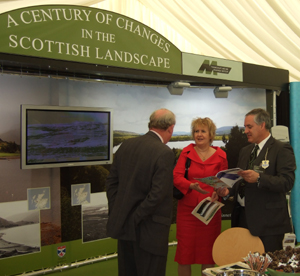What's new...
June 2009
'What's new' items from:
Fungal Ecologist Scoops Young Scientist Award
30 June 2009
Dr Ian Anderson, a fungal ecologist has been announced as the winner of the Asia Pacific Young Scientist Award in the area of Agriculture and Natural Resources.
The awards recognise and honour outstanding young scientists and researchers in the Asia-Pacific region who have made significant contributions to scholarship and research.
One hundred and four scientists and researchers under the age of 40 submitted their work for consideration in one of three categories: Business, Engineering and Technology and Agriculture and Natural Resources with Ian collecting his award based on the work he carried out at the Macaulay Land Use Research Institute on the ecology of fungi in native Scottish ecosystems at an event held at the Asian Institute of Technology in Bangkok, Thailand in June.
Now an Associate Professor at the School of Natural Sciences University of Western Sydney, Ian completed his PhD with the Macaulay Land Use Research Institute in 2001, and was promoted through the ranks to the position of Senior Research Scientist before returning to Australia in November 2007 to take up his current position.
In this capacity, Ian conducts a significant amount of research in the areas of plant-soil-microbe interactions, molecular ecology, and climate change. Ian has maintained his links with Scotland via honorary appointments with both The Macaulay Land Use Research Institute and the University of Aberdeen.
Royal Highland Show
29 June 2009
Staff from the Macaulay Land Use Research Institute attended the Royal Highland Show, Ingliston, Edinburgh from 25th-28th June 2009 to launch a research project which aims to reveal the types and extent of changes in the Scottish landscape over the past century through a systematic comparison of historical and contemporary photographs.
Amongst those who visited the exhibit were Roseanna Cunningham MSP (Minister for Environment), Maureen Watt MSP (Convener of the Rural Affairs and Environment Committee) Peter McGrath (Clerk to the Rural Affairs and Environment Committee), as well as senior staff from the Scottish Government.

The picture above shows Roseanna Cunningham being welcomed to the exhibit by Richard Aspinall, Chief Executive and Michael Gibson, Chairman of the Board of Governors at the Macaulay Land Use Research Institute.
You may also link to link into the other media now available from the show from the RHS website.
Moments in Time
8 June 2009
“Each period of time sets its mark on the landscape. Landscape reflects our priorities and values”
“A photograph’s unique feature is that it freezes and reflects both moment and place”
Tilbakebilikk - Norwegian Landscapes in Retrospect. Tun Forlag
Over time, views and landscapes within the city and countryside change. What our grandparents and their grandparents saw from their town house or country farm is most likely to be very different from what we see from our windows in 2009.
As new housing estates, industrial parks and road systems appear around our city and countryside, what our grandchildren and their grandchildren will see may be unrecognisable to us.
The Moments in Time photography competition challenged schoolchildren in Aberdeen and Aberdeenshire to photograph a view of their town, city or the countryside to record what our area looked like in 2009. This will allow future generations to see how we lived and worked today.
Entries were judged in three categories:
- Primary School class entry
- Individual attending Secondary School aged 13 years and under
- Individual attending Secondary School aged 14 - 18 years
The winners of the competition were decided by a panel of judges made up of Adam Henson from BBC’s Countryfile, experienced landscape photographer Oskar Puschmann from the Norwegian Forest and Landscape Institute, Richard Aspinall from the Macaulay Land Use Research Institute and Rick Rhode from the University of Edinburgh.
A 2010 calendar featuring the six winning photographs, plus six others rated as ‘highly commended’ is available.
For a free copy, please e-mail: enquiries@macaulay.ac.uk
33rd Macaulay Lecture
5 June 2009
Professor Foley, Director of the Institute on the Environment at the University of the Minnesota, was warmly welcomed to the Macaulay Land Use Research Institute to give the 33rd Macaulay Lecture.
The presentation, ‘Living on a Shrinking Planet: Challenges and Opportunities for Sustaining Global Land Use’, addressed the challenges of managing trade-offs between immediate human needs and the long-term capacity of the Earth to provide food, clean water, and to regulate the climate.
Prof Foley started his presentation by admitting that his childhood dream was to become an astromer, and coupled with an interest in gardening, this mixture of interests inspires his research.
Prof Foley outlined the challenges currently facing our planet, including the facts that between 1980 and 2000 the population of the Earth has almost doubled, the world economy grew seven-fold, use of fossil fuel rose by 400% and food consumption and water use tripled. "We are pushing the Planet to it's limits" he said.
The presentation also outlined the role that land use and agriculture plays in climate change with agricultural emissions accounting for one-thirds of global greenhouse gas emissions, and almost 85% of total global water consumption. In the last 40 years, the amount of land allocated to agriculture has grown by almost 12%, 10% more agricultural land is intensively irrigated, fertiliser use has grown 700% and there has been a marked decrease in the number of crops grown throughout the world.
Outlining the future of land use, Prof Foley highlighted that more crops are now grown for animal feed and that in the last 6 years, we've consumed more food than we grew meaning that global stockpiles of grains have been shrinking. Increasing populations, a preference for meat over a more vegetarian diet and increased use of petroleum (The Three P's) have led to an increased vulnerability for global food supplies.
Ending on a positive note, the need to link food, water and energy use was highlighted, plus the need to value things that have previously been ignored such as the value of land for flood prevention, mitigating natural disasters, and storing carbon plus the role of pollinating species.
"Choices and decisions we make now will affect future generations and beyond" stated Prof Foley.
You can find more stories about the Macaulay Land Use Research Institute in the latest edition of our newsletter, in-land.
News about upcoming events can be found here.
Media releases can be found here.
|
Updated: 23 Jan 2024, Content by: CN
|



